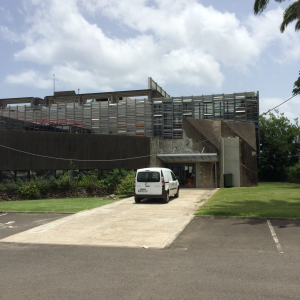Each month, a postgraduate student or an early career researcher shares their experiences of using a particular archive. The overall aim of this section is to create a database of the different archives available to those working on French and Francophone studies that will be of help particularly to students just starting out in research.
Michael Joseph (University of Oxford) works on the political legacy of the First World War in the French and British Caribbean. Here he discusses the Archives départementales de la Guadeloupe
The Archives départementales de la Guadeloupe (ADG) was established in 1951 following Guadeloupe’s transformation into a département in 1946. Départementalisation, however, does not seem to have led to a major redistribution of documents between France and its former colony. As such, the divide between the documents available at, for example, the Archives nationales d’outre-mer in Aix-en-Provence, and those still housed in Guadeloupe is essentially that imposed by the process of colonial administration itself. The documents available in the ADG therefore represent all those matters of government dealt with locally, deemed of insufficient importance to be sent to the metropole. But, to borrow a phrase, one man’s trash is another man’s treasure. If letters from soldiers in Algeria to relatives in Capesterre-Marie-Galante, petitions from soldiers’ mothers for separation allowances, and contracts laying out the design and erection of war memorials were unlikely to find their way to France, they nonetheless represent a rich body of evidence for historians of the First World War such as myself. Indeed, the same could probably be said for any number of twentieth-century topics. The lack of an online catalogue, however, makes definitive statements on the matter tricky; as is often the case with Caribbean archives, it is best to email ahead to enquire about the shape of the holdings in your particular research area before committing to a costly trip. The staff answered my questions promptly and comprehensively over email, and were unfailingly friendly during my time in Guadeloupe.
The ADG is located in St. Charles on the southern tip of Basse-Terre. Do not be seduced by the seemingly manageable 2.5-kilometre distance from Guadeloupe’s capital, also called Basse-Terre – the route from here to the ADG is largely uphill, intermittently unpaved, and uncomfortable even in the relative cool of the early morning. No public transport passes particularly close to the ADG, and taxis are surprisingly difficult to come by in Basse-Terre, so hiring a car is the best option. Not only does this make the somewhat remote ADG more accessible, it also gives you the means to explore one of the most beautiful islands in the Caribbean – the Chutes du Carbet, and the Plage de Grande Anse between Vieux Fort and Trois-Rivières come highly recommended.
The ADG is housed in a striking building which combines a concrete shell dating to the 1980s with a new, multicoloured glass superstructure, work on which is ongoing. The reading room itself is light, airy, and well-equipped (but not with Wi-Fi!). A couple of vending machines are available on site, and there is a very small shop some 200 metres down the road, but realistically it is best to bring food and drinks with you. Opening times are listed as Monday-Friday 8.00-17.00, except for Wednesdays when the archives shut at 12.30. However, these hours are liable to alteration at short notice over the summer months so, again, it pays to have checked any potential closures or reduction in hours with the ADG in advance.
Many thanks for this, Michael



